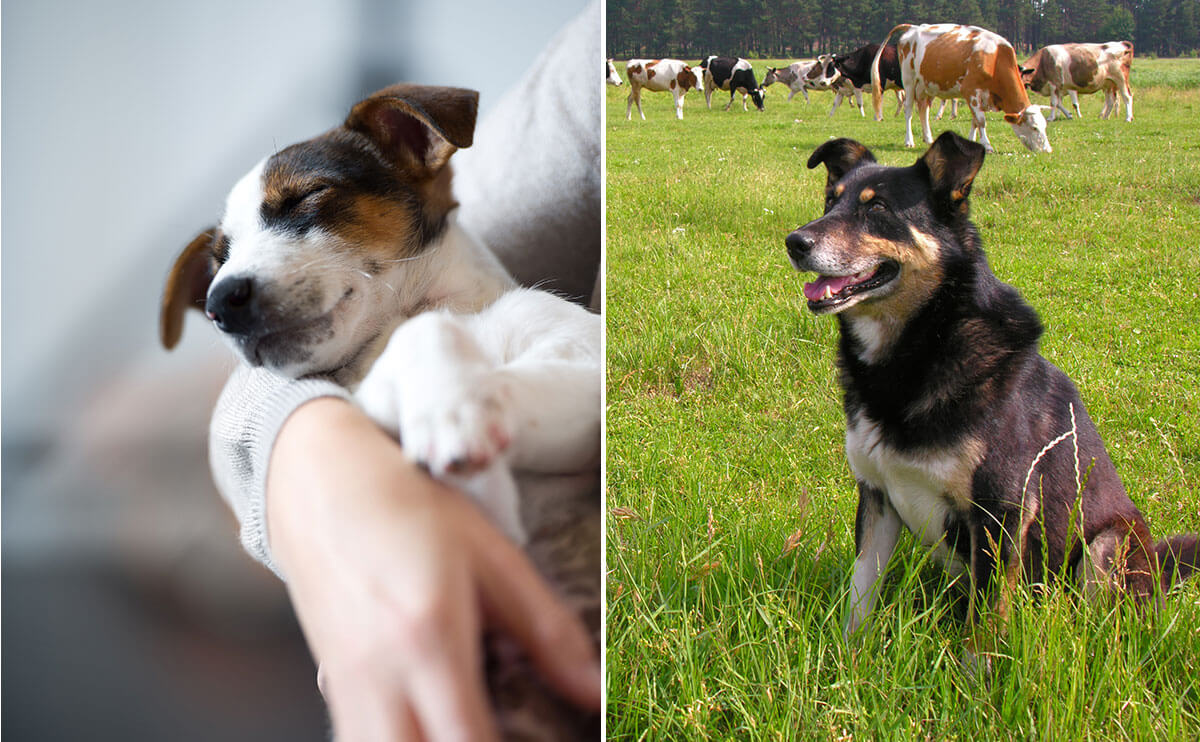Is the pooch out in the field happier than the dog who stays at home?

Recently, science has been reckoning with this question. An associate professor of animal behavior and well-being at Purdue University, Candace Croney began conducting cognitive tests on agility and companion dogs back in 2010. The tests ranged from basic — displacing a transparent cover to find food — to difficult — pressing the top end of a weighted tube to, again, find food — but in all cases, agility dogs generally performed better than companions.
“Agility dogs are exposed to different things and required to engage their brains more,” says Croney, who is also the director of Purdue’s Center for Animal Welfare Science. “Physical activity does facilitate the development of neurons and helps support good brain activity, which may possibly be contributing [to their success] as well.”
‘To an extent, a companion dog’s life revolves around you — when you’re out of the home, it’s on the couch all the time — so it’s not tapping into its potential.’
According to Julie Hecht, a canine behavioral researcher at Barnard College’s Horowitz Dog Cognition Lab and a Ph.D student at the City University of New York, a dog’s evolutionary design (i.e., their extremely sensitive noses) leads one to believe they were not meant to mainly live indoors. “To an extent, a companion dog’s life revolves around you — when you’re out of the home, it’s on the couch all the time — so it’s not tapping into its potential,” says Hecht. “Generally, a dog who has purpose, an understanding of a job, and exercise … those dogs have the potential to have a more fulfilling life.”
In fact, says Hecht, lap dogs on average tend to show more behavioral problems than larger dogs, in part because many small breeds, such as terriers, were first bred to be working dogs yet are no longer given substantial mental or physical challenges, let alone work. Also, bigger breeds usually receive more attention and training; for example, when a small dog barks at strangers, it’s written off as a cute, small-dog behavior and not corrected. “It seems that dogs that have the opportunity to be more active show fewer problem behaviors at home,” says Hecht. “They’re not frustrated or bored.”
Try buying puzzle toys for your dog instead of squeaky chew toys, and to hide treats to change up what your dog is getting and where it’s located.
Of course, there are exceptions to the rule. Hecht and Croney agree that forcing outdoor activity on an unwilling dog — particularly one that is old and injured, or unused to it — will yield no benefits, so don’t rush to send your dog to the (actual) farm. Rather, it is more important to break up the monotony of his or her everyday life and provide mental challenges. Croney suggests buying puzzle toys for your dog, instead of squeaky chew toys, and to hide treats to change up what your dog is getting and where it’s located. “You can also simply change the routes you walk, or try interspersing commands in between bouts of walking,” says Croney. “It’s about engaging the body as well as the mind.”
As for the working dog, it is highly likely that the average worker will also perform better on cognitive tests, much like the agility dog. A herding dog is regularly presented with new challenges, thanks to the unpredictable nature of livestock, and must process a lot more information each day, while getting a healthy amount of physical activity, as well. “Part of the reason agility dogs may perform better [on cognitive tests] is that often the breeds used for agility are working dogs, who are likely selected to attend to human social cues and, keeping in mind breed and individual variation, probably tend more to persevere at tasks,” says Croney.
Although the evidence does suggest that working dogs are more fulfilled than our dear pets at home, city-dwelling dog owners should not despair. By bringing the excitement of the farm to your fourth-floor walk-up (say, by hiding a pig’s ear in a makeshift paddock) your best friend will surely feel satisfied ”“ even without a flock of sheep to herd.